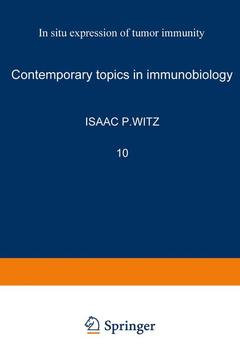Description
In Situ Expression of Tumor Immunity, Softcover reprint of the original 1st ed. 1980
Contemporary topics in immunobiology Series, Vol. 10
Coordinator: Witz Isaac
Language: English
Subject for In Situ Expression of Tumor Immunity:
Keywords
Antigen; biology; cancer; cell; immunobiology; lymphocytes; tissue; tumor; tumor growth
Publication date: 05-2013
348 p. · 15.2x22.9 cm · Paperback
348 p. · 15.2x22.9 cm · Paperback
Description
/li>Contents
/li>
Because of several valid (and some invalid) reasons, the research field of tumor immunology has been declining in popularity. The Simplistic dogmas, articles of faith, and theories of the late 1960s and early 1970s on the immuno logical mechanisms of the host-tumor interrelationships have frequently been refuted by some of the new developments in cancer biology, cancer biochem istry, and immunology. Furthermore, some of the conventional assays used to monitor "tumor-host immune relations" did not always reflect the host's true clinical situation or his prognosis. Several approaches to immunological interven tion were less successful than expected. In addition, the concept of "immune surveillance," which was basic to many researchers in the field of cancer im munology, seemed to fall apart. Much of the criticism was based on results from solid, well-performed, and well-controlled experiments, but there was also un just criticism based on ill-conceived and badly performed studies, and on misin terpretations of experimental data. There are many misconceptions about the tumor-host relationship. It is very often assumed that tumor immunity, as expressed systemically, is truly reflected at the tumor site. Several studies reported in this volume and elsewhere indicate that such is not always the case. Certain immune effectors may be selectively prevented from reaching the tumor site or the close vicinity of the tumor cells because of mechanical or chemical barriers, whereas others may be selectively attracted to the site by chemotaxis or other mechanisms.
1 A Review of Data, Problems, and Open Questions Pertaining to in Situ Tumor Immunity.- 2 Separation of Individual Kinds of Cells from Tumors.- 3 Immunologic Reactivity of Lymphoid Cells in Tumors.- 4 Separation and Characteristics of Tumor-Infiltrating Lymphocytes in Man.- 5 Intratumor Host Cells of Experimental Rat Neoplasms: Characterization and Effector Function.- 6 Evidence for Mononuclear Phagocytes in Solid Neoplasms and Appraisal of Their Nonspecific Cytotoxic Capabilities.- 7 Mononuclear Cells and IgG Associated with Human Malignant Tissue.- 8 Evidence for Membrane-Bound Antibodies Directed against Antigens Expressed on Tumors.- 9 Tumor-Localizing Lymphocytotoxic Antibodies.- 10 Correlations between Tumor Antigenicity, Malignant Potential, and Local Host Immune Response.- 11 Host Cell Analysis of a Rapidly Metastasizing Mouse Tumor and Derived Low-Metastatic Variant Lines.- 12 Cellular Basis for Regulation of Tumor Growth.- 13 Immunological Stimulation in Situ: The Acute and Chronic Inflammatory Responses in the Induction of Tumor Immunity.- 14 Tumor Immunity in the Peritoneal Cavity.- 15 The Multicellular Tumor Spheroid: A Quantitative Model for Studies of in Situ Immunity.
© 2024 LAVOISIER S.A.S.
These books may interest you

Lipid Metabolism in Tumor Immunity 158.24 €

The Tumor Immunoenvironment 210.99 €


